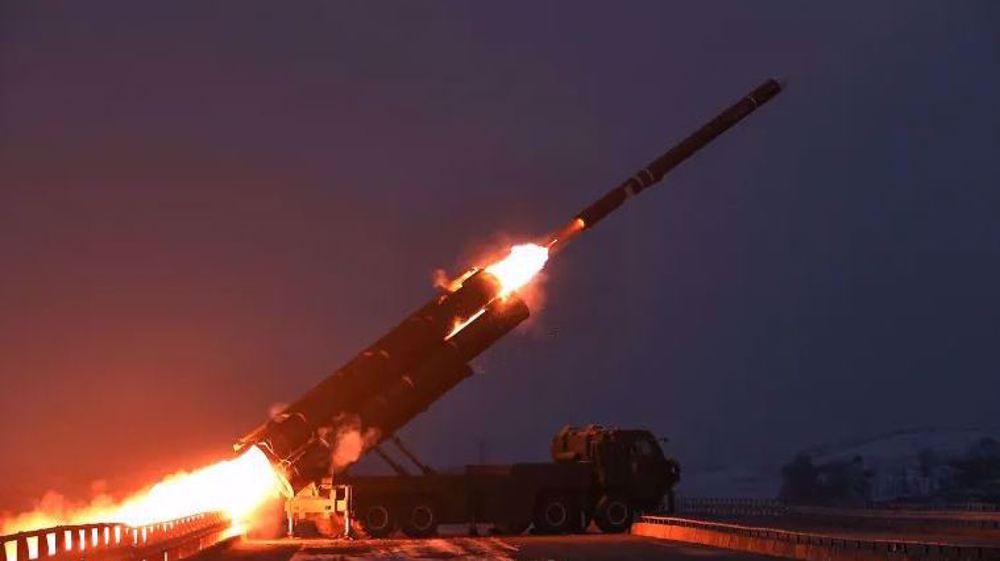North Korea unlikely to have attained ICBM tech: S Korean spy agency
South Korean National Intelligence Service (NIS) says it is unlikely that North Korea has yet achieved the necessary technology to build intercontinental ballistic missiles (ICBMs), as Pyongyang celebrates the “successful launch” of the country’s first such missile a week earlier.
The NIS, according to South Korea's Yonhap news agency, made the comments in a report to the parliamentary intelligence committee on Tuesday, saying Pyongyang does not seem to have relevant testing facilities to coat the missile with proper protection to prevent it from burning up its warhead as it re-enters Earth's atmosphere.
“Although North Korea claimed that [the missile's] heat resistance was verified, whether it re-entered [the atmosphere safely] was not confirmed and the country has no relevant test facility, making it look like it has not secured the technology,” the NIS report added.
The spy agency’s account came a week after Pyongyang announced that, in a technological breakthrough, it had successfully tested an ICBM, claiming that it could “reach anywhere in the world.” North Korean leader Kim Jong-un also described the missile at the time as a gift to “American bastards” on their Independence Day.
Yi Wan-young, a member of the South Korean parliament's intelligence committee, said the NIS could not confirm that the North’s Hwasong-14 ICBM test on July 4 had been successful. “Considering how North Korea does not have any testing facilities [for re-entry technology], the agency believes [North Korea] has not yet secured that technology,” he added.
North Korea at the time claimed that its guided ballistic missile flew 933 kilometers, in 39 minutes, reaching an altitude of 2802 kilometers. Russia, however, was the first country to raise doubt on the nature of the missile, with its Ministry of Defense saying on Sunday that it was in fact an intermediate-range missile (IRBM). The ministry’s statement further said that the missile actually flew some 535 kilometers and reached an altitude of 510 kilometers.
The United States, which is strongly against the North’s nuclear and missile programs and an avid supporter of imposing further tough sanctions against Pyongyang, still insists that what North Korea launched on July 4 was most likely a new ICBM with an estimated range of 5,500 kilometers and capable of hitting Alaska.

According to John Schilling, an aerospace engineer, Pyongyang’s ICBM is “likely” to be capable of delivering a 500-kilgram warhead to San Diego in two years time.
“If the Hwasong-14 is put together the way we think it is, it can probably do a bit better than that when all the bugs are worked out. It will likely become a missile that can reliably deliver a single nuclear warhead to targets along the US west coast,” he added, in a report he wrote on Monday on the respected 38 North website, a monitoring project linked to US Johns Hopkins University.
He also speculated that North Korea’s ICBM would attain a range of 9,700 kilometers with a 500-kilogram warhead on board.
The US has already announced that it had tested an ICBM interceptor missile of its own in May, particularly in order to eliminate alleged potential nuclear and missile threats posed by the North.
Unsettled by North Korean missile and nuclear programs, Washington has adopted a war-like posture, sending a strike group and conducting joint military drills with North Korea’s regional adversaries Japan and South Korea.
North Korea, which has been under huge international pressure and sanctions over its missile and nuclear programs, sees the country’s missile and nuclear arsenal as a strong deterrent against US aggression.
Yemen military chief: Support will continue until Palestine liberated
Iranian military advisor warns of enemy plots, urges national unity
VIDEO | One year on, Dr. Hussam Abusafiah still suffering in Israeli jails
Iran repels massive cyberattack on communications infrastructure
Eslami: Iran’s nuclear industry advances despite sanctions, strikes
VIDEO | Martyr Abu Mahdi warship
Iran’s engineering feat beneath Persian Gulf for gas supply
Israeli military confirms soldier’s death in apparent suicide case














 This makes it easy to access the Press TV website
This makes it easy to access the Press TV website